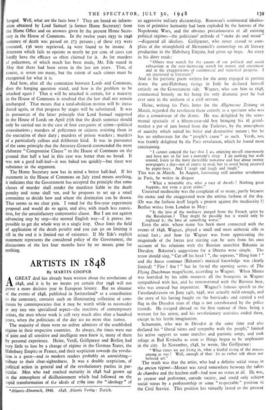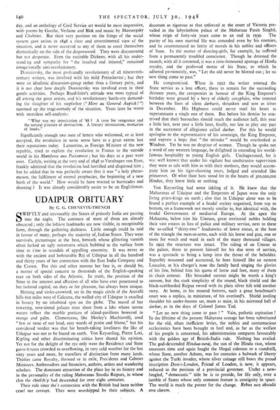ARTISTS IN 1848
By MARTIN COOPER
AGREAT deal has already been written about the revolutions of 1848, and it is by no means yet certain that 1948 will not prove a more decisive year in European history. But an almanac of the events of 1848, published in Switzerland* as a contribution to the centenary, contains such an illuminating collection of com- ments by contemporaries that it may be worth while to reconsider at any rate one specialised aspect—the reactions of contemporary artists, the men whose work is still very much alive after a hundred years, when the politicians of the day are no more that: names.
The majority of them were no ardent admirers of the established regime in their respective countries. As always, the times were out of joint and all sensitive and intelligent men knew it, many of them by personal experience. Heine, Verdi, Grillparzer and Berlioz had very little to lose by a change of regime in the German States, the Habsburg Empire, or France, and their scepticism towards the revolu- tion is a great—and to modern readers probably an astonishing— tribute to their clear-sightedness. It was a double scepticism, of political action in general and of the revolutionary parties in par- ticular. Men who had reached maturity in 1848 had grown up in the atmosphere of disillusionment which had followed on the rapid transformation of the ideals of 1789 into the "ideology" of *Atlantis-Almanack, 1948. 1848, Atlantis Verlag : Zurich. an aggressive military dictatorship. Rousseau's sentimental idealisa- tion of primitive humanity had been exploded by the horrors of the Napoleonic Wars, and the obvious precariousness of all existing political regimes—the politicians' attitude of " make do and mend "
—disgusted all idealists. Grillparzer, who never ceased to com- plain of the stranglehold of Metternich's censorship on all literary production in the Habsburg Empire, had given up hope. An entry in his diary reads:
" Others may search for the causes of our political and social exhaustion in the ever-increasing, search for money and enjoyment and in the exaggerations of commercial and industrial progress. I am interested in literature."
And in his patriotic poem written for the army engaged in putting
down the anti-Habsburg risings in Italy he declared himself
entirely on the Government side.. Wagner, who saw him in 1848, commented bitterly on his being the only dramatic poet he had ever seen in the uniform of a civil servant.
Heine, writing his Paris letter for the Allgememe Zeitung in March, regarded the revolution there entirely as a spectator who was
also a connoisseur of the drama. He was delighted by the senti- mental spectacle of a fifteen-year-old boy bringing his ill grand- mother a pot of jam looted from the Tuileries, by the atmosphere of anarchy which suited his bitter and destructive nature ; but he has no enthusiasm for the " people's cause" as such. Verdi, too, was frankly delighted by the Paris revolution, which he found most entertaining.
" I cannot conceal the fact that I au. enjoying myself enormously and have not so far lost a moment's sleep. I do nothing but walk around, listen to the most incredible nonsense and buy about twenty newspapers a day—not of course to read, but to avoid being pestered by paper-boys. And I laugh and laugh and laugh."
This was in March. In August, foreseeing still another revolution
in Paris, he writes in disgust
" What a miserable era, what a race of dwarfs ! Nothing great happens, not even a great crime."
Universal mediocrity was the complaint of so many, partly because the exotic and the exaggerated were the artistic fashion of the day.
(Or was the fashion itself largely a protest against the mediocrity ?) Berlioz writes from London in May:
" Is the love of the mediocre purged from the French spirit by the Revolution ? That might be possible but it would only be replaced bi the love of something worse."
Even the artis. whose name has been most connected with the events of 1848, Wagner, played a small and most unheroic role in
actual fact ; and how far Wagner was from appreciating the magnitude of the forces just stirring can be seen from his own
account of his relations with the Russian anarchist Bakunin in Dresden. Bakunin's suggestions for a libretto were simple. The tenor should sing, "Cut off his head ! ", the soprano, " Hang him ! "
and the basso continuo (Bakunin's musical knowledge was clearly limited) " Fire ! fire ! " but he found the opening scene. of The Flying Dutchman magnificent, according to Wagner. When Minna was horrified by his table manners all the bourgeois in Wagner sympathised with her, and he remonstrated with the Russian bear, who was amused but impenitent. Wagner's famous speech to the Vaterlandsverein on June 14th, 1948, was actually mild enough, and the story of his having fought on the barricades and carried a red flag in the Dresden riots of 1849 is not corroborated by the police records. He escaped abroad on the first rumour of there being a warrant for his arrest, and his revolutionary activities ended there,
except in his fertile imagination.
Schumann, who was in Dresden at the same time and also
declared his " liberal views and sympathy with the people," limited his active support to some marches and patriotic songs, and took refuge at Bad Kreischa as soon as things began to be unpleasant in the city. In NoVember, 1848, he wrote, like Grillparzer:
" What times we are living in, what a fearful rising of the masses among us too I Well, enough of that: let us rather talk about our beloved art."
The truth was that the artist, who had a definite social status in
the ancien regime—Mozart was rated somewhere between the valets
de chambre and the kitchen staff—had now no status at all. He was, as creator and performer, outside society, and could only achieve social status by a professorship or some " respectable " position in the Civil Service. This position has virtually lasted to the present day, and an anthology of Civil Service art would be most impressive, with poems by Goethe, Verlaine and Blok and music by Mussorgsky and Chabrier. But their very position on the fringe of the social system gave artists in 1848 a clear and unsentimental view of the situation, and it never occurred to any of them to enrol themselves dramatically on the side of the dispossessed. They were discontented but not desperate. Even the excitable Dickens, with all his under- standing and sympathy for " the insulted and injured," remained unequivocally anti-revolutionary.
Dostoievsky, the most profoundly revolutionary of all nineteenth- century writers, was involved with his mild Petrashevtsi ; but they were an idealistic discussion-group rather than a literary party, and it is not clear how deeply Dostoievsky was involved even in their gentle activities. Perhaps Baudelaire's attitude was most typical of all among the great artists, and h:s revolutionary 'battle-cry demand- ing the slaughter of his stepfather ("Mort au General Aupick ! ") summed up the tragi-comedy of the situation. Years later he wrote with merciless self-analysis :
" What was my intoxication of '48 ? A taste for vengeance and the natural pleasure of destruction. A literary intoxication, memories of books."
Significantly enough two men of letters who welcomed, or at least accepted, the revolution in some sense have to a great extent lost their reputations today. Lamartine, as Foreign Minister of the new republic, tried to explain the revolution in France to the outside world in his Manifeste aux Puissances ; but his days as a poet were over. Carlyle, writing at the very end of 1848 to Varnhagen von Ense, frankly admitted that the revolution had horrified and disgusted him ; but he added that he was perfectly aware that it was " a holy pheno- menon, the fulfilment of eternal prophecies, the beginning of a new birth of the world." How would he have reacted to barricades and shooting ? It was already considerably easier to be an Englishman.



































 Previous page
Previous page